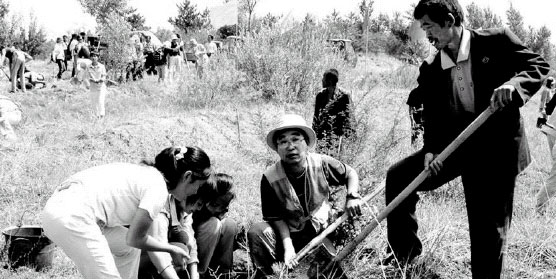| Home / Living in China / Life in Pictures | Tools: Save | Print | E-mail | Most Read |
| Saving Someone Else's Backyard |
| Adjust font size: |
Kunio Takami (center) plants pine saplings with local people in Dayuanshan Village of Datong's Green, a color of life and hope, is not how you'd think to describe a place like the sandy and dry Loess Plateau. But since 1992, about 17 million saplings have been grown along the northeastern rim, which covers the rural areas of In 1992, Kunio Takami established a non-governmental organization called the Green Earth Network (GEN) in Actually, Takami had dedicated himself to friendly exchange between "I came to "At the suggestion of All-China Youth Federation and after a field survey to At that time, he was just one of an inspection group from Kunio Takami has been planting trees in Datong of north China's "If I left, the whole undertaking would run aground," he said. For the last 15 years, Takami has commuted from Takami spent more than three months in "In terms of the time I spent in However, Takami was initially given the cold shoulder from local people in "Back in As time went by, more and more Chinese and Japanese were attracted to the GEN's initiatives. Over the past 15 years, the organization has collected 20 million yuan ($2.6 million) in donations from "As we all know, "They were not familiar with each other at first, but as the work progressed, they became very close. Before the volunteers left for They did meet again and again. "Many of our volunteers visited With "At the start of our endeavor, I really did not imagine we could carry on for such a long time and achieve so much," Takami said. About 30 percent of the projects are to build orchards (mainly of apricots trees) for local elementary schools in poverty-stricken areas. Apricots can endure drought and bring short-term profits 5 to 10 times more than normal crops, Takami said. Some profits goes to participating farmers, some to the schools and the rest is for the upkeep of the trees. The other 70 percent of the projects are to plant pine trees on hills, to prevent and control water loss and soil erosion. This takes at least 20 years to become effective. Local villagers became enthusiastic in the projects when they knew planting trees could also improve their living standard, Takami said. For example, by growing normal crops such as potato and wheat, each farmer in Wucheng Village of Datong's Many have been touched by Takami's resolve to carry out the GEN's projects in Yu Wen, who was Takami's interpreter when two groups of Japanese volunteers recently visited But Takami said: "With only me, the GEN could do nothing. It's the concerted efforts from involved parties that is driving me not to give up." He said he had received a lot of support from his Chinese partners which coordinated between the GEN and As Takami is so busy in "People often kidded I was my wife's oldest son instead of husband." Although Takami said little about his family, Wu told China Daily that his wife supports him by working as an accountant in the GEN. In Since 2004, Takami began paying tuition fees for her. "I will continue to sponsor her if she goes to college," he said. At the same time, Takami has also helped build four Hope primary schools in Last year, Takami was recognized as an "honorary resident" by Takami said he did have a sense of achievement but he is still concerned about the problems at hand. As one of Located on the Loess Plateau, "Even for the drought-enduring trees, water is needed or they will easily die," said Wu, the office head. "Shortage of water has become one of the major hurdles to carry out our projects," he said. ( |
| Tools: Save | Print | E-mail | Most Read |
 |
| Related Stories |
|
